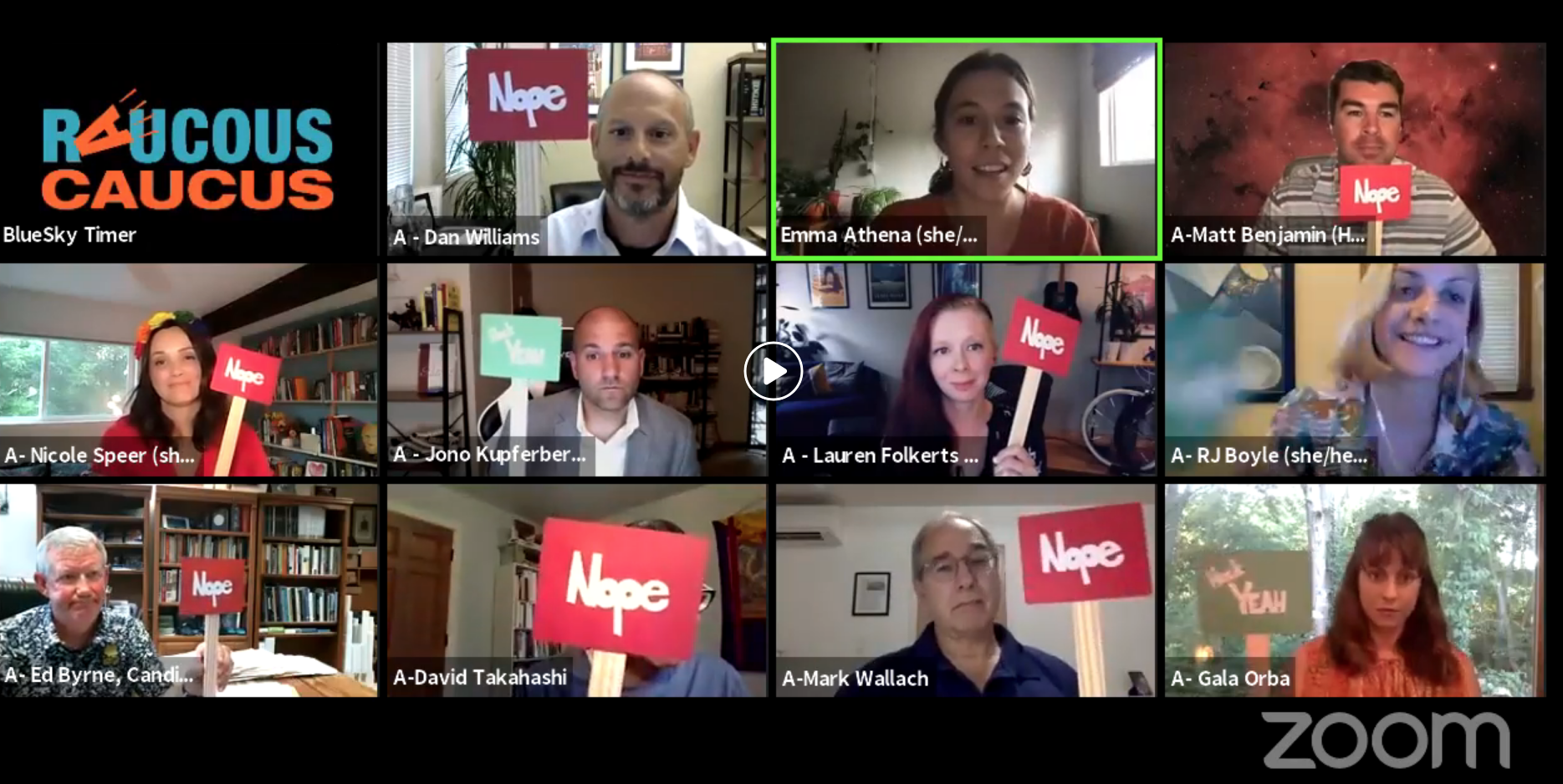Slightly less Raucous Caucus offers look at potential council candidates

Thursday, June 24, 2021
Unions are good, Black Lives Matter and local elected officials should be paid a living wage. On that much, all 10 potential candidates for Boulder city council agreed during Wednesday night’s Raucous Caucus, the first forum of the election season. As to all the rest of the important issues — including the existence of aliens — consensus has yet to be reached.
The virtual event was hosted by political group Boulder Progressives and United Campus Workers, which represents student, faculty, staff and graduate employees of the University of Colorado system. It was perhaps a slightly less raucous caucus than two years ago (though there was a Zoom bomb involving pornographic video), But the mood was light and the answers revealing.
Some highlights
There were many areas of near-universal agreement — perhaps not surprising, given Boulder’s homogenous politics and the leanings of host groups, though candidates of all stripes were invited to attend.
During a lightning round of quick yes/no questions, everyone indicated they would vote for the Bedrooms Are For People ballot measure except for current councilman Mark Wallach. That initiative would allow unrelated adult to live in each bedroom of a house; occupancy is currently capped at 3-4 persons, irrespective of home size.
Similarly, Wallach was the lone holdout on reallocation of police funds to other city needs, allowing tiny homes in Boulder (he didn’t answer) and support of a library district (Jono Kupferberg was ambivalent). He and David Takahashi stood alone against enthusiasm for allowing accessory dwelling units throughout the city. Takahashi was a hard no, whereas Wallach said he was a “heck maybe.”
Among the 10, there were two renters: RJ Boyle and Jono Kupferberg.
Gala Orba, who also ran in 2019, identified herself as a renter in the lightning round but clarified that she does in fact own a home outside city limits. She uses it as a vacation rental, and rents an apartment in Boulder “in order to live the lifestyle I want to live in Boulder.”
Takahashi was the sole candidate of color.
Who’s running
Wednesday’s attendees were:
- Nicole Speer, a scientist and research manager at CU
- Mark Wallach, current city council member
- Lauren Folkerts, an architect and chair of Boulder’s Design Advisory Board
- Ed Byrne, a longtime civically engaged resident who has twice run for city council
- Gala Orba, a former teacher and current waitress and aerial yoga instructor
- Dan Williams, an attorney who handled Bedrooms’ lawsuit against the city
- RJ Boyle, an environmental planner and renter
- David Takahashi, a retired software engineer who has engaged in climate activism such as advocating for the muniA utility that would be owned by the city of Boulder. Shorthand for municipalization, which is the p...
- Matt Benjamin, a “freelance astronomer” with political involvement, including organizing the Our Mayor, Our Choice campaign
- Jono Kupferberg, an entrepreneur and self-described pragmatist
Paul Cure, who campaigned unsuccessfully in 2019, and Parks and Rec Advisory Board member
Tara Winer have announced their intention to run but did not attend due to scheduling conflicts.
There may be others who are still undecided about running or who chose not to attend. Candidates have until August to officially declare, but hopefuls often identify themselves early in bids to score coveted endorsements from various political groups. Winnowing occurs throughout the summer, with “slates” often identified in the fall.
With the might and money of political machines behind them, endorsed candidates tend to perform better. All nine current city council members earned political endorsements.
Who’s not running
Wallach is the sole incumbent seeking re-election this year. Mayor Sam Weaver and Mary Young, first elected in 2013, Mirabai Nagle (2017) and Adam Swetlik (2019) all declined to seek re-election.
All come from Boulder’s slow-growth faction, typified by backing from PLAN-Boulder, a dominant force in local politics for decades. Boulder’s political fault lines tend to fall along issues of growth and development rather than political parties. City council is a non-partisan body.
The remaining four members were all backed by The Coalition or its member groups
(Boulder Progressives, Better Boulder, etc.). That means this election could tip the balance of power away from a slow-growth majority on city council for the first time since a (short-lived) switch in 2017.
Other issues have begun to eclipse the obsession with how many people live here. Boulder’s budget is commanding more attention as sales tax stagnates. Social issues have played an increasingly important role in recent years, an area where slow-growth groups have tended to struggle.
Attitudes may have shifted as well as Boulder’s housing crisis weighs heavy. In a recent survey, 70% of respondents said housing issues were very or extremely important to address, up from 53% in 2016. Affordable projects from the city’s housing authority often sail through the approval process when, just five years ago, they were subject to massive neighborhood protests and even lawsuits.
On Wednesday night, there were two other questions which elicited unanimous responses from the assembled candidates:
Is Boulder full? No.
Is Boulder’s declining population of concern to you? Yes.
Watch video of Raucous Caucus (live feed begins after event start)
Raucous Caucus Twitter threads from:
Bedrooms Are For People
— Shay Castle, boulderbeatnews@gmail.com, @shayshinecastle
Want more stories like this, delivered straight to your inbox? Click
here to sign up for a weekly newsletter from Boulder Beat.
Elections Governance affordable housing Bedrooms Are For People Black Lives Matter Boulder Boulder Progressives budget campaign candidates city council city of Boulder CU Design Advisory Board development elections growth housing minimum wage occupancy limits Our Mayor Our Choice PLAN Boulder County policing politics ranked choice voting Raucous Caucus transportation United Campus Workers University of Colorado

